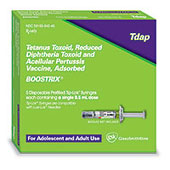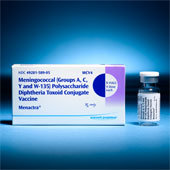November 5th, 2011 by Paul Auerbach, M.D. in Health Tips, News
1 Comment »

 Most of us are familiar with the need to achieve immunization against tetanus (“lockjaw”) and diphtheria. Fewer are familiar with the need to immunize against pertussis (“whooping cough”). Boostrix is a vaccine used to achieve immunity against all three. Until recently, there had not been a vaccine approved by the Food and Drug Administration (FDA) against pertussis intended for use in elders (ages 65 years and older). On July 8, 2011, the FDA approved Boostrix for use in this population of seniors.
Most of us are familiar with the need to achieve immunization against tetanus (“lockjaw”) and diphtheria. Fewer are familiar with the need to immunize against pertussis (“whooping cough”). Boostrix is a vaccine used to achieve immunity against all three. Until recently, there had not been a vaccine approved by the Food and Drug Administration (FDA) against pertussis intended for use in elders (ages 65 years and older). On July 8, 2011, the FDA approved Boostrix for use in this population of seniors.
The link to the FDA announcement is http://www.fda.gov/NewsEvents/Newsroom/PressAnnouncements/ucm262390.htm
Whooping cough is not a trivial disease. It is a highly communicable infectious disease caused by the bacterium Bordetella pertussis. It is transmitted by respiratory secretions or large droplets from the respiratory tract of an infected person. In children, whooping cough is typified by Read more »
This post, FDA Approves Tetanus/Diphtheria/Pertussis Vaccine For Adults Over 65, was originally published on
Healthine.com by Paul Auerbach, M.D..
September 2nd, 2011 by Paul Auerbach, M.D. in Research
No Comments »

 I am often asked by elder persons whether or not they should take the herpes zoster (“shingles”) vaccine. Up until this point, I have been answering “yes” based on my own experience, but now there is some data to support this recommendation.
I am often asked by elder persons whether or not they should take the herpes zoster (“shingles”) vaccine. Up until this point, I have been answering “yes” based on my own experience, but now there is some data to support this recommendation.
In the article, “Herpes Zoster Vaccine in Older Adults and the Risk of Subsequent Herpes Zoster Disease,” Hung Fu Tseng and his colleagues reported their findings in the Journal of the American Medical Association (JAMA 2011;305[2]:160-161). They evaluated the risk of herpes zoster after persons received the vaccine in a general practice setting.
In a retrospective (looking back at a cohort of patients from medical records) study, the researchers compared Read more »
This post, Article Recommends Herpes Zoster Vaccine For Adults Over 60, was originally published on
Healthine.com by Paul Auerbach, M.D..
August 20th, 2011 by Paul Auerbach, M.D. in Research
1 Comment »

 Yellow fever is an affliction caused by a potentially lethal viral (flavivirus) hemorrhagic (causes bleeding) virus common in parts of Africa and South America. A highly effective vaccine made from live virus (known as the “17D vaccine”) is currently used to inject persons to prevent yellow fever; this vaccine is known to rarely cause serious adverse effects, namely, onset of allergic reactions, or a life-threatening or fatal infection that resembles yellow fever.
Yellow fever is an affliction caused by a potentially lethal viral (flavivirus) hemorrhagic (causes bleeding) virus common in parts of Africa and South America. A highly effective vaccine made from live virus (known as the “17D vaccine”) is currently used to inject persons to prevent yellow fever; this vaccine is known to rarely cause serious adverse effects, namely, onset of allergic reactions, or a life-threatening or fatal infection that resembles yellow fever.
So, there is need for a safer (“nonreplicating”—in other words, not based on live virus) vaccine. In a recent article, “An Inactivated Cell-Culture Vaccine against Yellow Fever,” Thomas Monath, MD and his coauthors described their experience with a potentially safer vaccine (NEJM, 2011;364:1326-33). In their study, Read more »
This post, Advancement In Research For A Safer Yellow Fever Vaccine, was originally published on
Healthine.com by Paul Auerbach, M.D..
May 26th, 2011 by Paul Auerbach, M.D. in Health Tips
No Comments »

 One of the most feared infectious diseases for outdoor travelers—particularly children and young adults—meningitis caused by the bacterium Neisseria meningitidis (meningococcus). The infection can appear in outbreaks, most commonly abroad, particularly in sub-Saharan Africa and China.
One of the most feared infectious diseases for outdoor travelers—particularly children and young adults—meningitis caused by the bacterium Neisseria meningitidis (meningococcus). The infection can appear in outbreaks, most commonly abroad, particularly in sub-Saharan Africa and China.
The infection is spread in the respiratory secretions of humans. The disease appears in many forms, the most common of which are meningitis, pneumonia, and disseminated bacterial infection. The typical presentation of meningitis is fever, headache, and a stiff neck. If the cause is meningococcus, the victim may develop a skin rash, which consists of red dots or bumps, or a flat, more patchy dark red discoloration.
If the dark red dots begin to enlarge and coalesce into large purplish bruise-like discolorations, this is a bad sign. In the worst cases, a victim can develop shock, respiratory failure, diffuse bleeding, and death. Approximately one in 10 victims of meningococcal meningitis dies. Read more »
This post, Do You Know How To Recognize Deadly Bacterial Meningitis?, was originally published on
Healthine.com by Paul Auerbach, M.D..
November 1st, 2010 by Dr. Val Jones in Health Tips, News
No Comments »
 Vaccines have saved more lives than any other medical intervention in history. They are incredibly safe and effective and are well-tolerated by most people. In the US, the Centers For Disease Control and Prevention (CDC) carefully reviews all reports of adverse reactions that could be associated with vaccines. Over decades of review, they have found that the rate of potential severe reactions is so low that they cannot even calculate a risk.
Vaccines have saved more lives than any other medical intervention in history. They are incredibly safe and effective and are well-tolerated by most people. In the US, the Centers For Disease Control and Prevention (CDC) carefully reviews all reports of adverse reactions that could be associated with vaccines. Over decades of review, they have found that the rate of potential severe reactions is so low that they cannot even calculate a risk.
There are many vaccines available for babies, children, and adults. Please check these vaccine schedules to make sure that you and your family are fully protected from vaccine-preventable diseases. (Or you can ask your doctor/nurse to review your vaccine needs with you in person.)
Vaccines for ages 0-6 click here.
Vaccines for ages 7-18 click here.
Vaccines for adults click here.
In case you have any doubts about the value of protecting yourself from disease, here are my top 10 reasons to get vaccinated: Read more »
 Most of us are familiar with the need to achieve immunization against tetanus (“lockjaw”) and diphtheria. Fewer are familiar with the need to immunize against pertussis (“whooping cough”). Boostrix is a vaccine used to achieve immunity against all three. Until recently, there had not been a vaccine approved by the Food and Drug Administration (FDA) against pertussis intended for use in elders (ages 65 years and older). On July 8, 2011, the FDA approved Boostrix for use in this population of seniors.
Most of us are familiar with the need to achieve immunization against tetanus (“lockjaw”) and diphtheria. Fewer are familiar with the need to immunize against pertussis (“whooping cough”). Boostrix is a vaccine used to achieve immunity against all three. Until recently, there had not been a vaccine approved by the Food and Drug Administration (FDA) against pertussis intended for use in elders (ages 65 years and older). On July 8, 2011, the FDA approved Boostrix for use in this population of seniors.


 I am often asked by elder persons whether or not they should take the herpes zoster (“shingles”) vaccine. Up until this point, I have been answering “yes” based on my own experience, but now there is some data to support this recommendation.
I am often asked by elder persons whether or not they should take the herpes zoster (“shingles”) vaccine. Up until this point, I have been answering “yes” based on my own experience, but now there is some data to support this recommendation. Yellow fever is an affliction caused by a potentially lethal viral (flavivirus) hemorrhagic (causes bleeding) virus common in parts of Africa and South America. A highly effective vaccine made from live virus (known as the “17D vaccine”) is currently used to inject persons to prevent yellow fever; this vaccine is known to rarely cause serious adverse effects, namely, onset of allergic reactions, or a life-threatening or fatal infection that resembles yellow fever.
Yellow fever is an affliction caused by a potentially lethal viral (flavivirus) hemorrhagic (causes bleeding) virus common in parts of Africa and South America. A highly effective vaccine made from live virus (known as the “17D vaccine”) is currently used to inject persons to prevent yellow fever; this vaccine is known to rarely cause serious adverse effects, namely, onset of allergic reactions, or a life-threatening or fatal infection that resembles yellow fever. One of the most feared infectious diseases for outdoor travelers—particularly children and young adults—meningitis caused by the bacterium Neisseria meningitidis (meningococcus). The infection can appear in outbreaks, most commonly abroad, particularly in sub-Saharan Africa and China.
One of the most feared infectious diseases for outdoor travelers—particularly children and young adults—meningitis caused by the bacterium Neisseria meningitidis (meningococcus). The infection can appear in outbreaks, most commonly abroad, particularly in sub-Saharan Africa and China.








